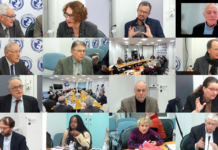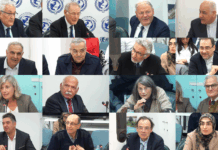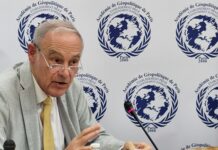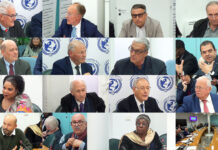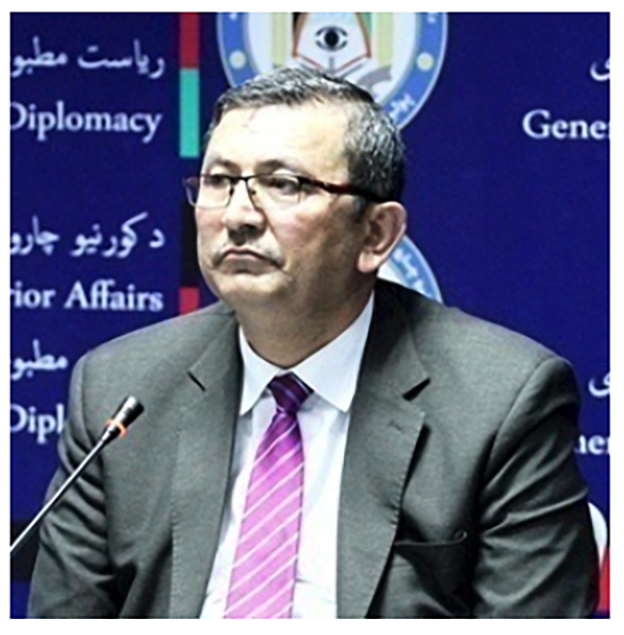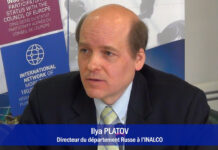Téléchargez l’article au format PDF
Général Mirza Mohammad YARMAND
Résumé : Ce qu’il se passe en Afghanistan, en Syrie, au Moyen-Orient est en réalité la répétition du nouveau paradigme de la Guerre froide moderne, avec de nouveaux mécanismes, qui amène le monde vers l’abîme d’une troisième guerre mondiale. Les stratégies ambigües des grandes puissances contre le terrorisme international ont amené à un embrasement plutôt qu’à un équilibre, et sont également à l’origine de la crise que traverse aujourd’hui l’Afghanistan. L’Afghanistan abrite aujourd’hui une partie des forces organisées du terrorisme mondial, avec 25 groupes terroristes radicaux présents dans le pays, abris, camps de formation, troc supposé de ressources minières avec certaines puissances en échange d’équipements avancés, etc. De plus, l’existence d’une force arriérée, rétrograde et radicale au pouvoir en Afghanistan produira une crise humanitaire et sécuritaire dans la région et le monde, puisque le maintien des Talibans aura des conséquences lourdes : effondrement de la stabilité et de la sécurité en Afghanistan, crise humanitaire, développement du trafic de stupéfiants, expansion des mouvements terroristes à l’intérieur du pays, exportation de la crise et intensification du conflit dans la région, intensification des stratégies anti-occidentales, utilisation par certaines puissances de tels mouvements, voire utilisation de ces groupes les uns contre les autres. Actuellement, les terroristes construisent des madrasas destinées aux mineurs, réparent du matériel militaire en panne, et surtout mènent un effort pour accéder à la fabrication d’armes tactiques nucléaires et biologiques et pour l’expansion globale du terrorisme. Le trafic de stupéfiants et la traite des êtres humains sont mis en œuvre pour financer ces activités, qui touchent jusqu’à l’Europe. Les conflits ouverts (Ukraine, Proche-Orient) profitent au terrorisme, le monde étant incapable de mener une guerre non-conventionnelle contre le terrorisme. Si l’Occident possède la théologie, il est dépourvu d’idéologie, alors que les terroristes ont les deux, ce qui devrait nous inquiéter. Il nous faut agir sagement et intelligemment, car les générations futures nous jugeront, et certaines pistes peuvent servir d’arrière-plan à la résolution de la crise.
Mots-clés : Talibans, Instabilité, Moyen-Orient, Monde, Terrorisme international, Afghanistan, Guerre froide moderne, Géostratégie, Géopolitique, États-Unis d’Amérique, Puissances, Crise humanitaire, Sécurité, Trafic de stupéfiants, Trafic humain, Occident, Madrasas, Armes tactiques, Nucléaire, Biologique, Conflits, Guerre non-conventionnelle.
THE TALIBAN REGIME AND ITS CONSEQUENCES ON REGIONAL AND GLOBAL INSTABILITY
Abstract : What is happening in Afghanistan, in Syria, in the Middle East is in reality the repetition of the new paradigm of the modern Cold War, with new mechanisms, which is bringing the world towards the abyss of a third world war. The ambiguous strategies of the great powers against international terrorism have led to a conflagration rather than a balance, and are also at the origin of the crisis that Afghanistan is going through today. Afghanistan today hosts part of the organized forces of global terrorism, with 25 radical terrorist groups present in the country, shelters, training camps, supposed barter of mining resources with certain powers in exchange for advanced equipment, etc. Furthermore, the existence of a backward, retrograde and radical force in power in Afghanistan will produce a humanitarian and security crisis in the region and the world, since the maintenance of the Taliban will have serious consequences: collapse of stability and security in Afghanistan, humanitarian crisis, development of drug trafficking, expansion of terrorist movements inside the country, export of the crisis and intensification of the conflict in the region, intensification of anti-Western strategies, use by certain powers of such movements, or even use of these groups against each other. Currently, terrorists are building madrasas for minors, repairing broken military equipment, and above all leading an effort to access the manufacturing of tactical nuclear and biological weapons and for the overall expansion of terrorism. Drug trafficking and human trafficking are used to finance these activities, which affect even Europe. Open conflicts (Ukraine, Middle East) benefit terrorism, the world being incapable of waging an unconventional war against terrorism. If the West has theology, it lacks ideology, while the terrorists have both, which should worry us. We must act wisely and intelligently, because future generations will judge us, and certain avenues can serve as a background to resolving the crisis.
Key words : Taliban, Instability, Middle East, World, Global terrorism, Afghanistan, Modern Cold War, Geostrategy, Geopolitics, United States of America, Powers, Humanitarian crisis, Security, Drug trafficking, Human trafficking, West, Madrasas, Tactical weapons, Nuclear, Biological, Conflicts, Unconventional war.

